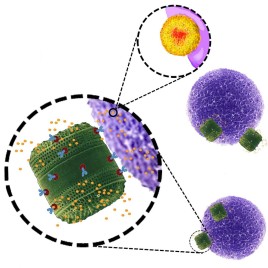Reaching strict climate goals could mean that a sizeable number of people will remain dependent on traditional stoves, despite the negative health impacts. Researchers examined the relationship between climate mitigation policies and clean energy costs in South Asia. They found the most stringent mitigation policies could increase the cost of clean fuel by 38 per cent, leaving as many as 433 million South Asians […]
Tag: health
Biologics and Biosimilars | SMCC Webinar
Biologics and Biosimilars | SMCC Webinar | January 7, 2016 | Video available Biopharmaceuticals, or Biologics have successfully improved the care of several hard to treat conditions, such as rheumatoid arthritis, Crohn’s disease and cancer. More of these complex biological drugs are coming. In the US over 900 biologics are being developed for more than 100 diseases. While they […]
How Ebola spread during the 2014-2015 epidemic
Using genome sequencing researchers have mapped how the Ebola virus spread in Western Africa during 2014 – 2015. They found Ebola entered the country several times during the early outbreak, however most of the infections were due to a single introduction of the virus, which spread rapidly. Researchers performed the sequencing in Liberia to trace the […]
E-cigarette flavourings linked to respiratory disease
Tests of 51 flavours of e-cigarettes have found 47 have chemicals which have been linked to respiratory disease. Those tested included flavours such as Cupcake and Cotton Candy, which are targeted towards younger consumers. Diacetyl, which is considered a respiratory hazard by the Flavor and Extract Manufacturers Association of the USA, was found in more […]
Dear, Health Minister – some friendly advice
The editors of the Canadian Medical Association Journal published a letter to Canada’s new Minister of Health, Dr. Jane Philpott. They called on Dr. Phillpott to let science and evidence guide policy. The authors also asked the new minister to follow through on her promises to expand home care, improve vaccination rates, and address mental […]
DNA stutters provide a hidden layer of information
Repetitive pieces of DNA, previously thought to be “junk”, play an important role in regulating how genes are expressed, according to a recent study. Short Tandem Repeats (STRs), are sections of DNA which are repeated, similar to a stutter. Researchers found STRs are able to fine tune the expression of nearby genes, and that different […]
Saving with supervised injection sites
Creating supervised injection facilities in Toronto and Ottawa would be a cost-effective way to prevent people from developing hepatitis C, according to an updated analysis. The researchers believe there is an 86 per cent chance one or more supervised injection facilities would be cost-effective in Toronto, and a 90 per cent chance in Ottawa. They […]

Fighting cancer with algae
A microscopic algae, called diatoms, have been genetically altered to target and deliver drugs to cancerous cells without harming healthy tissue. Researchers used a two-step strategy to attach antibodies as well as drug molecules to the algae, creating a targeted delivery system. The authors of the paper say the efficacy of the system, as well […]
Repairing DNA in a matter of weeks
Reprogramming and genetically correcting stem cells can be achieved in as little as two weeks thanks to a new technique. This advance could offer potential therapies for individuals with a range of genetic disorders. Previous techniques to create stem cells from a patient’s tissue and reprogram the stem cell to remove a negative mutation took […]

The dangers of prescription painkillers for women
Women suffering from opioid addiction are more likely to become addicted from doctor-prescribed painkillers, such as OxyContin and codeine, than men according to a new study. Researchers believe more studies examining the development and effects of opioid addiction in women are needed to provide better treatment options. The study of 503 patients attending methadone […]
Eating two homemade meals a day cuts diabetes risk
Eating two homemade meals per day lowers the risk of developing type 2 diabetes according to recent research from the American Heart Association. Researchers found that individuals who ate a homemade lunch and dinner everyday had a 13 per cent lower risk when compared to individuals who ate fewer than six homemade meals each week. […]
Brain cancer cells form connected network
Microtubes connecting brain tumor cells allow a specific type of brain cancer, known as gliomas, to spread quickly and become resistant to radiation therapy, a new study shows. This knowledge will allow researchers to target for future treatment efforts. These microtubes allow cancerous cells to reach out and form connections, allowing them to grow as […]
APGAR scores provide clues about the mothers’ health
Researchers found a strong correlation between a newborn’s Apgar score and whether the mother will be admitted to the ICU after delivery. The researchers hope these findings will help doctors predict which mothers will become critically ill after giving birth, and may help predict which mothers need additional medical checks. The study analyzed data from […]
Stomach fat increases risk of diabetes during pregnancy
Women with a high level of abdominal fat during the first trimester of pregnancy have a higher risk of developing gestational diabetes later on during pregnancy, according to a new study. Researchers measured the abdominal fat of 485 women during the end of their first trimester (11 – 14 weeks), and later measured their oral […]
Quebec’s TB troubles
Québec’s unusually high rate of tuberculosis (TB) is most likely due to the local environment and cultural practices, rather than a particularly potent strain of TB, according to researchers. Québec has an incidence rate 50 times higher than the Canadian average. Researchers performed whole-genome sequencing on 163 TB samples from 11 geographically isolated villages in […]
Preventing food allergies in infants
A review by Canadian physicians suggests parents can help prevent food allergies in their children by introducing allergenic foods early. The authors show that with a few exceptions, introducing these foods between four and six months of age can safely help prevent the development of food allergies. The authors recommend exposing infants at low risk […]